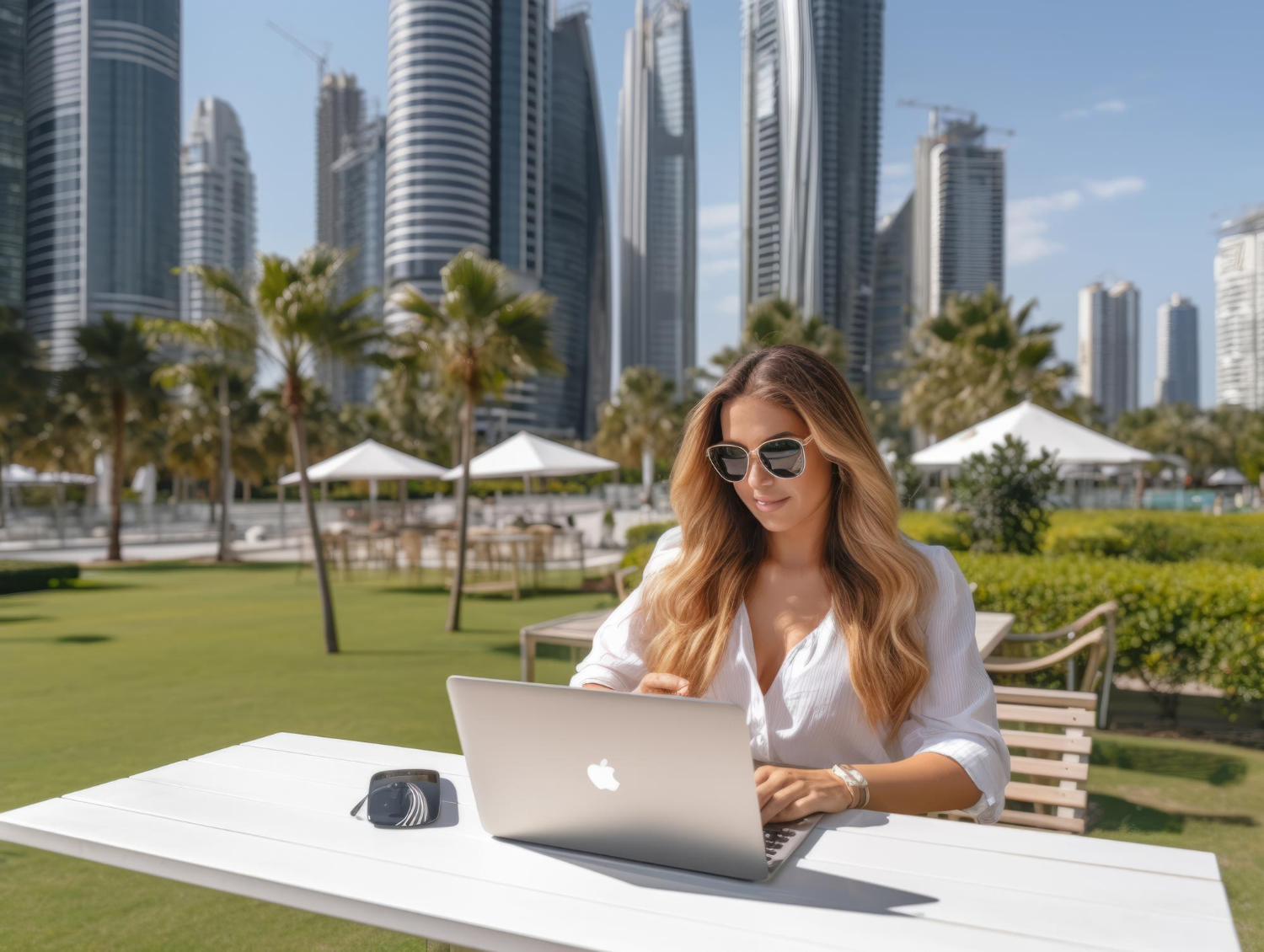Dubai in 2025 is a thriving hub for women entrepreneurs, offering a progressive environment with tax benefits, a multicultural market, and government support for small businesses. As an agent for Global Business Setup, we specialize in helping women launch their ventures by navigating licensing, free zone setups, and compliance. Below is a detailed exploration of business ideas for ladies in Dubai, along with an expanded FAQ section to address key concerns.

1. Event Planning and Management
Market Opportunity: Dubai’s event industry is a powerhouse, hosting over 500 major events annually, from luxury weddings to global conferences like GITEX and Expo. The sector is projected to reach AED 1.55 trillion by 2028, driven by the city’s status as a global tourism and business hub. Women with a knack for creativity and organization can carve a niche in wedding planning, corporate events, or cultural festivals, catering to both locals and tourists.
Startup Requirements: You’ll need a professional license from the Department of Economic Development (DED) or a free zone like Dubai World Central (DWC). Initial costs include licensing fees (around AED 10,000–15,000), a website for marketing, and networking with vendors like caterers and venues. Building a portfolio through smaller events can help establish credibility.
Challenges: High competition from established firms requires strong branding and unique offerings, such as themed events or sustainable practices. Managing client expectations in a luxury market can also be demanding.
Growth Strategies: Leverage Dubai’s event calendar by targeting peak seasons like winter for weddings. Partner with hotels and venues for referrals, and use social media to showcase your work. Expanding into destination wedding planning for international clients can boost revenue.
2. E-Commerce and Online Retail
Market Opportunity: The UAE’s e-commerce market is set to hit $8 billion in 2025, fueled by a 92% internet penetration rate and a growing preference for online shopping among Dubai’s diverse population. Women can sell niche products like modest fashion, handmade jewelry, or eco-friendly goods, targeting both local and regional markets via platforms like Amazon.ae, Noon, or Instagram.
Startup Requirements: A trade license from a free zone like IFZA (starting at AED 12,500) offers 100% ownership and tax benefits. You’ll need a website or marketplace account (AED 2,000–5,000), inventory, and a logistics partner for deliveries. Social media marketing skills are crucial for visibility.
Challenges: Competition from large platforms and managing logistics costs can be hurdles. Ensuring product quality and customer service is vital to build trust in a crowded market.
Growth Strategies: Focus on a niche to differentiate—think sustainable fashion or vegan skincare. Use targeted ads on Instagram and TikTok to reach Dubai’s younger demographic. Expanding to other GCC countries like Saudi Arabia can scale your business.
3. Beauty Salon and Wellness Services
Market Opportunity: Dubai’s beauty and wellness industry, projected at $2.4 billion by 2026, thrives on demand for premium services like facials, hair treatments, and spa therapies. The city’s focus on luxury and self-care, especially among expat women, makes this a promising sector for female entrepreneurs.
Startup Requirements: Start with a home-based setup (AED 5,000–10,000 for equipment and products) and a professional license from the DED. Scaling to a salon in areas like Jumeirah or Downtown Dubai requires a larger space (rent AED 50,000–100,000/year) and additional staff. Compliance with health and safety regulations is mandatory.
Challenges: High rental costs in prime locations and competition from established salons can be barriers. Maintaining hygiene standards and skilled staff is critical to retain clients.
Growth Strategies: Offer unique services like organic treatments or bridal packages. Build a loyal client base through loyalty programs and social media reviews. Partner with hotels to offer spa services for tourists.
4. Food Business (Tiffin Service or Specialty Café)
Market Opportunity: Dubai’s 16 million tourists in 2023 and its 3.5 million residents create a diverse food market. A tiffin service offering healthy, home-cooked meals can cater to busy professionals, while a specialty café (e.g., vegan or fusion cuisine) can attract food enthusiasts and tourists.
Startup Requirements: A food license from the Dubai Municipality (AED 10,000–15,000) and a small kitchen setup (AED 20,000–30,000) are needed for a tiffin service. A café requires a larger investment (AED 100,000–200,000) for rent, equipment, and staff in areas like Al Barsha or DIFC.
Challenges: Strict food safety regulations and high competition in the F&B sector require consistent quality. For cafés, high rents and customer acquisition costs can strain finances initially.
Growth Strategies: Use food delivery apps like Talabat or Deliveroo to reach a wider audience. For cafés, host events like cooking classes or themed nights to draw crowds. Focus on niche diets (e.g., keto, gluten-free) to stand out.
5. Social Media Management and Digital Marketing
Market Opportunity: With the UAE’s digital ad market expected to hit $1.45 billion by 2028, businesses increasingly rely on social media for growth. Women with skills in content creation, SEO, or influencer marketing can offer services to local startups, salons, or global brands from home.
Startup Requirements: A professional license (AED 7,500–10,000) and a laptop with internet access are the basics. Online certifications in digital marketing (e.g., Google Ads, HubSpot) can enhance skills for AED 1,000–3,000. Building a portfolio via freelance platforms like Upwork is a good start.
Challenges: Keeping up with algorithm changes and proving ROI to clients can be tough. Building a client base in a competitive field requires persistence and networking.
Growth Strategies: Specialize in a niche like Instagram Reels for beauty brands. Offer bundled services (e.g., content creation + ad management) to increase value. Attend networking events like STEP Conference to connect with potential clients.
6. Interior Decor and Home Staging
Market Opportunity: Dubai’s $0.71 trillion real estate market in 2024 drives demand for interior decor, especially for luxury villas and apartments. Women can offer home staging for real estate sales or bespoke decor services, aligning with trends like sustainable or smart home designs.
Startup Requirements: A trade license (AED 10,000–15,000) and a portfolio of designs are essential. Initial costs for software (e.g., SketchUp) and sample materials are around AED 5,000–10,000. Partnering with real estate agents can help secure clients.
Challenges: High client expectations in a luxury market and competition from established firms can be hurdles. Sourcing affordable, high-quality materials is another challenge.
Growth Strategies: Focus on eco-friendly designs to appeal to Dubai’s sustainability goals. Collaborate with developers for large projects like those in Dubai Hills. Use Instagram and Pinterest to showcase your work.
7. Fashion Boutique or Alteration Service
Market Opportunity: Dubai’s fashion industry, boosted by events like Dubai Fashion Week, supports boutiques offering custom or modest clothing. Alteration services cater to expats needing tailored fits, tapping into the city’s diverse fashion demands.
Startup Requirements: Start from home with a trade license (AED 7,500–10,000) and sewing equipment (AED 5,000). Opening a boutique in areas like City Walk requires higher investment (rent AED 60,000–120,000/year) and inventory costs.
Challenges: High competition and keeping up with fashion trends can be demanding. Building a loyal customer base requires excellent service and marketing.
Growth Strategies: Offer bespoke abaya designs or bridal alterations to target niche markets. Use social media influencers to promote your boutique. Participate in local fashion events to gain visibility.
8. Pet Care Services
Market Opportunity: The growing pet ownership trend in Dubai, especially among expats, supports pet grooming, daycare, or supply stores. The UAE’s pet care market is expanding, with pet owners spending on premium services and products.
Startup Requirements: A trade license (AED 10,000) and a small setup for grooming (AED 15,000–20,000) are needed. For a store, add inventory costs (AED 20,000). Compliance with animal welfare regulations is crucial.
Challenges: Ensuring hygiene and safety is critical to avoid customer complaints. Competition from larger pet chains can be a barrier.
Growth Strategies: Offer mobile grooming services to reach busy clients. Sell organic pet food or accessories to diversify revenue. Partner with vet clinics for referrals.
9. Language Tutoring and Online Coaching
Market Opportunity: Dubai’s 200+ nationalities create demand for language tutoring (e.g., English, Arabic, French) and online coaching for exams or skills. Women with teaching experience can cater to students, professionals, or expat families.
Startup Requirements: A professional license (AED 7,500) and a laptop with Zoom access are sufficient to start. Teaching credentials or certifications (e.g., TEFL for AED 1,000) add credibility. Marketing via social media or tutoring platforms like Preply is key.
Challenges: Building a student base in a competitive market takes time. Scheduling across time zones for online classes can be tricky.
Growth Strategies: Offer group classes to increase revenue. Specialize in high-demand areas like IELTS preparation. Partner with schools or expat communities for referrals.
10. Consultancy Services (Wedding, Education, Migration)
Market Opportunity: Dubai’s status as a global hub attracts clients needing wedding, education, or migration consultancy. Women with expertise can guide families on school admissions, visa processes, or wedding planning.
Startup Requirements: A professional license (AED 10,000) and a small office (rent AED 20,000–40,000/year) are needed. Building a network with schools, immigration lawyers, or wedding vendors is crucial for referrals.
Challenges: Staying updated on visa regulations and school admission criteria is essential. Competition from larger firms requires strong personal branding.
Growth Strategies: Offer bundled services (e.g., visa + school admission guidance). Use LinkedIn to connect with expats relocating to Dubai. Host webinars on trending topics like UAE Golden Visa.
11. Fitness Coaching and Yoga Studio
Market Opportunity: The AED 1.2 billion wellness market in the UAE supports fitness coaching and yoga studios, especially for women seeking personalized or female-only sessions. Dubai’s health-conscious expats and locals drive this demand.
Startup Requirements: Start with online classes (AED 5,000 for a license and equipment) or a small studio (rent AED 40,000–80,000/year). A fitness certification (e.g., NASM for AED 2,000) and a professional license are required.
Challenges: High competition from gyms like Fitness First and rental costs in prime areas can be barriers. Retaining clients requires consistent quality and community building.
Growth Strategies: Offer outdoor yoga sessions in parks like Zabeel Park. Create a women-only fitness community to build loyalty. Use Instagram Live for free sessions to attract clients.
12. Handmade Crafts and Art Gallery
Market Opportunity: Dubai’s tourism and luxury markets value unique handmade crafts or art for gifts and decor. Women can sell pottery, calligraphy, or paintings at local markets or online, targeting tourists and high-end buyers.
Startup Requirements: A trade license (AED 7,500) and materials (AED 5,000–10,000) are needed to start. Selling via Etsy or at markets like Ripe Market (stall fees AED 500–1,000) can generate early sales.
Challenges: Scaling production while maintaining quality can be tough. Competition from imported goods requires strong branding as a local artisan.
Growth Strategies: Collaborate with hotels or malls to display your art. Offer workshops (e.g., pottery classes) to engage customers. Export to GCC countries to expand your market.
Why Choose Global Business Setup?
Global Business Setup simplifies your entrepreneurial journey with end-to-end support. We handle licensing, free zone registrations (e.g., SHAMS, IFZA), and compliance, ensuring 100% ownership, tax exemptions, and seamless setup. Our expertise in cost-effective solutions empowers women to launch and grow their businesses in Dubai’s competitive market.
Getting Started
- Market Research: Study demand, competition, and customer preferences.
- Licensing: Secure the right license with our guidance.
- Support: Leverage our consultancy for marketing, legalities, and scaling.
Dubai’s strategic location, business-friendly policies, and multicultural population make it an ideal launchpad for women entrepreneurs in 2025. Let us help you turn your vision into a thriving business.
Final Thoughts
Dubai’s dynamic economy, tax-free environment, and inclusive policies make it a prime destination for women entrepreneurs in 2025. Whether you’re starting a beauty salon, e-commerce venture, or consultancy, Global Business Setup is your partner in navigating the setup process and achieving success. Contact us today to bring your business idea to life in this vibrant city.
Frequently Asked Questions
Q: What types of licenses do I need to start a business in Dubai, and how does Global Business Setup assist?
A: You’ll need a trade license for retail or product-based businesses (e.g., e-commerce, pet care), a professional license for service-based ventures (e.g., consultancy, tutoring), or a commercial license for larger operations. Costs start at AED 7,500–15,000. Global Business Setup streamlines the process by handling applications, documentation, and approvals, ensuring compliance with DED or free zone regulations.
Q: Can women own 100% of a business in Dubai, and what are the benefits of free zones?
A: Yes, women can own 100% of their business in free zones like IFZA, SHAMS, or Dubai Media City. Benefits include zero corporate tax, full profit repatriation, no customs duties, and simplified setup processes. We help you choose the best free zone based on your business needs and budget.
Q: How much capital is required to start these businesses, and can I get financing?
A: Capital varies: e-commerce or tutoring can start at AED 5,000–10,000, while a café or salon may need AED 50,000–200,000. Financing options include SME loans from banks like Emirates NBD or government programs like the Dubai SME initiative, which supports women entrepreneurs. We can guide you on accessing these resources.
Q: Are there specific zones or programs for women entrepreneurs in Dubai?
A: While there are no women-only zones, initiatives like the Dubai Women Establishment (DWE) offer mentorship and funding support. Free zones like SHAMS provide affordable packages (starting at AED 8,500) with flexible setups. We assist in connecting you with women-focused programs and networks.
Q: What are the tax benefits for women starting a business in Dubai?
A: Dubai offers zero personal income tax and no corporate tax in free zones. You also benefit from customs duty exemptions and no currency restrictions, making it easier to reinvest profits. These advantages apply to all entrepreneurs, and we ensure you maximize them through strategic setup.
Q: How long does it take to set up a business with Global Business Setup, and what’s the process?
A: Setup typically takes 1–2 weeks. The process includes choosing a business activity, securing a license, registering with authorities, and opening a bank account. We manage all steps, from document submission to visa approvals, ensuring a hassle-free experience.
Q: Can I operate a home-based business in Dubai, and what are the limitations?
A: Yes, a home business license allows ventures like tutoring, e-commerce, or alteration services. Limitations include restrictions on physical signage and client visits at home, depending on your residential area. We help you secure the right license and ensure compliance with local rules.
Q: What support does Global Business Setup provide for marketing and growth?
A: We offer consultancy on digital marketing, including SEO, social media strategies, and influencer partnerships. We also connect you with local networks, suppliers, and events to boost visibility. Our growth support includes advice on scaling, such as adding new services or expanding to other emirates.
Q: How can I ensure compliance with Dubai’s regulations for my business?
A: Compliance involves adhering to licensing, health, safety, and labor laws. For example, food businesses must meet Dubai Municipality standards, while salons need hygiene approvals. Global Business Setup ensures your business meets all requirements through audits and updates on regulatory changes.
Q: What are the best locations in Dubai for a physical business like a salon or café?
A: Prime areas include Jumeirah, Downtown Dubai, and DIFC for high foot traffic, though rents are higher (AED 80,000–200,000/year). Affordable options like Al Barsha or Deira (AED 30,000–60,000/year) suit startups. We help you choose a location based on your target market and budget.



Leave A Comment